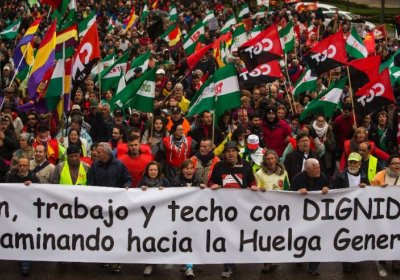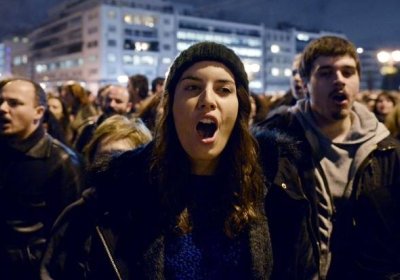A central pillar of the Spanish economic and political establishment came crashing down on Paril 16.
Rodrigo Rato, former deputy prime minister in the 1996-2004 People’s Party (PP) government of Jose Maria Aznar and head of the International Monetary Fund from 2004 to 2007, was detained on suspicion of tax evasion, concealment of assets and fraud.
Spain
Spain's left-wing Podemos party would win a general election if it were held today, a Metroscopa poll released on April 12 found. General elections are scheduled for December.
Podemos, which was founded in January last year, came first with the support of 22.1% of those questioned. The opposition Spanish Socialist Workers Party (PSOE) regained lost ground to come second with 21.9% of the vote. The ruling conservative Popular Party (PP) would come third with 20.8% of the vote.
Spain: Education sector strikes against privatisation
Professors and students in more than 40 Spanish cities went on strike on March 24 against the government’s education reform aimed at privatising the public sector.
According to the unions who organised the strike, there was an 85% participation rate. High schools reached 90% participation around the country, according to a statement by Workers Commissions, FETE-UGT, the Independent Central of State Officials and Students of Spain in Movement.
Thousands of demonstrators from across Spain gathered in Madrid’s main Colon Square on March 21 to protest against continuing harsh government austerity measures. Nine columns of demonstrators, who had been on the march for several days, converged on the plaza.
Labelled Marches for Dignity, at least 20,000 people packed Colon Square, carrying republican flags and banners calling for a general strike.
An international campaign for the release of jailed Basque pro-independence leader Arnaldo Otegi was launched at a conference in the European Parliament in Brussels on March 24.
A statement calling for Otegi’s release was announced at the conference, which has been endorsed by international figures including former Latin American presidents, Nobel Prize winners, political representatives and former political prisoners.
The March 22 regional elections in Andalusia, Spain’s most populous and second-poorest region, opened this year's critical election calendar.
This election cycle includes local government and 13 regional elections on May 24 and a September 27 poll in Catalonia that will double as an independence referendum. It will culminate in national Spanish elections in November.
The future course of politics in the Spanish state and Europe will greatly depend on the results of these contests.
Experience proves that left-wing movements can win government, but nevertheless not hold power. Democracy, in other words the exercise of power by the people and for the people, requires much more.
The problem is now being faced in Greece with with radical left party SYRIZA, which won elections in January. It will have to be faced in Spain if the new anti-austerity party Podemos wins November elections.
What does the victory of radical left party SYRIZA in Greece's January 25 elections mean for politics in Europe, at Europe-wide and national levels? Both levels are closely intertwined, and since SYRIZA’s win have been having rapid feedback effects on each another.
Across Europe, the reverberations of SYRIZA’s win are being felt with rising force, both in “peripheral” Europe, but also in the German-led European Union “core”.
Offshore oil drilling operations off Western Sahara, carried out by the US firm Kosmos Energy, were denounced by Western Sahara Resources Watch (WSRW) on March 2.
“Kosmos Energy did nothing to obtain the consent of the people of Western Sahara,” said WSRW chair Erik Hagen.
The Dallas-based company said its exploration well had not yielded a commercial find and would be plugged, Associated Press said on March 2.
Following SYRIZA’s victory in the Greek election on January 25, a number of commentators have turned their attention toward Spain, where the left-wing Podemos party, which originally emerged from the Indignados protest movement, has been receiving strong polling numbers since the end of 2014.
Tens of thousands of people took to the streets in Madrid on January 31 in a huge “March for Change” to support Spain's new anti-austerity party Podemos.
The party has grown in support after the left-wing, anti-austerity SYRIZA party in Greece won last week's elections. This has brought hope that change could be in the air for other European countries whose debt is being used to justify austerity.
On the demonstration, people chanted “yes we can” and “tic tac tic tac” ― suggesting the clock was ticking and time was running out for the political elite.
If anyone was still wondering whether European politics and a Europe-wide class struggle actually exist, reactions from all quarters to the first two weeks of Greece’s new SYRIZA-led government would have cleared up any doubts.
The conflict between Europe’s ruling elite and the new Greek anti-austerity administration, headed by radical left party SYRIZA, reached a high point on February 4-5.
- Previous page
- Page 12
- Next page










